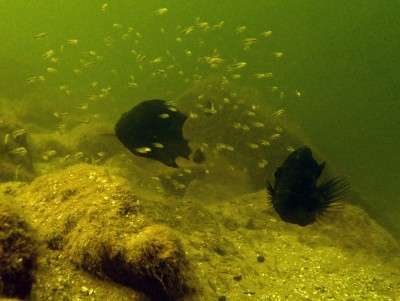Fishy parents distinguish friend from foe

With intruders lurking everywhere, the volcanic crater lakes of Nicaragua can be a dangerous place to raise a family, especially if you're a fish.
Cichlid fish parents have come up with a clever solution, according to a new study by an international team of researchers from the University of Turku, Finland, and Monash University, Australia.
Not only do these fish defend their territory and offspring from potential predators – but are capable of strategically adjusting their levels of aggression by using visual cues to distinguish friend from foe.
Lead researcher Dr Topi Lehtonen explained that during the breeding season, several different species of cichlids establish territories and raise their young in the same area.
"When they are breeding, parents rely on stored energy reserves and are busy looking after their own fry to pose much of a threat to the fry of other parents," Dr Lehtonen said.
"The same, however, cannot be said of non-breeders, which are only too happy to sneak into a parent's territory and snap up some of their young."
This is where the different colour markings sported by breeding and non-breeding individuals come in handy.
In an experiment carried out in Lake Xiloá, the researchers presented parent cichlids with 'dummy' intruders made by gluing photographs of another species of cichlid fish – both breeders and non-breeders - onto a piece of plastic suspended in the water column.
By using dummies rather than live intruders, the researchers were able to experimentally disentangle any differences in response from parents that might be due to the intruder's behaviour.
"The parents attacked the models as if they were real intruders," said Associate Professor Bob Wong, from the School of Biological Sciences at Monash.
The researchers found that cichlid parents paid close attention to the intruder's body markings when adjusting their aggression levels.
"Parents were far more aggressive towards the model intruders displaying non-breeding colour markings compared to those in breeding colouration," Professor Wong said.
"The results are significant because they show that animals can use cues displayed in another species to obtain valuable information that can then be used to adjust their own behaviours.
"While this research was conducted on cichlids which are native to the Americas, Africa and Asia, it is likely that this kind of strategic behaviour could also be seen more widely and across other species."
The study was published in the peer-reviewed journal, The American Naturalist.
Journal information: American Naturalist
Provided by Monash University

















